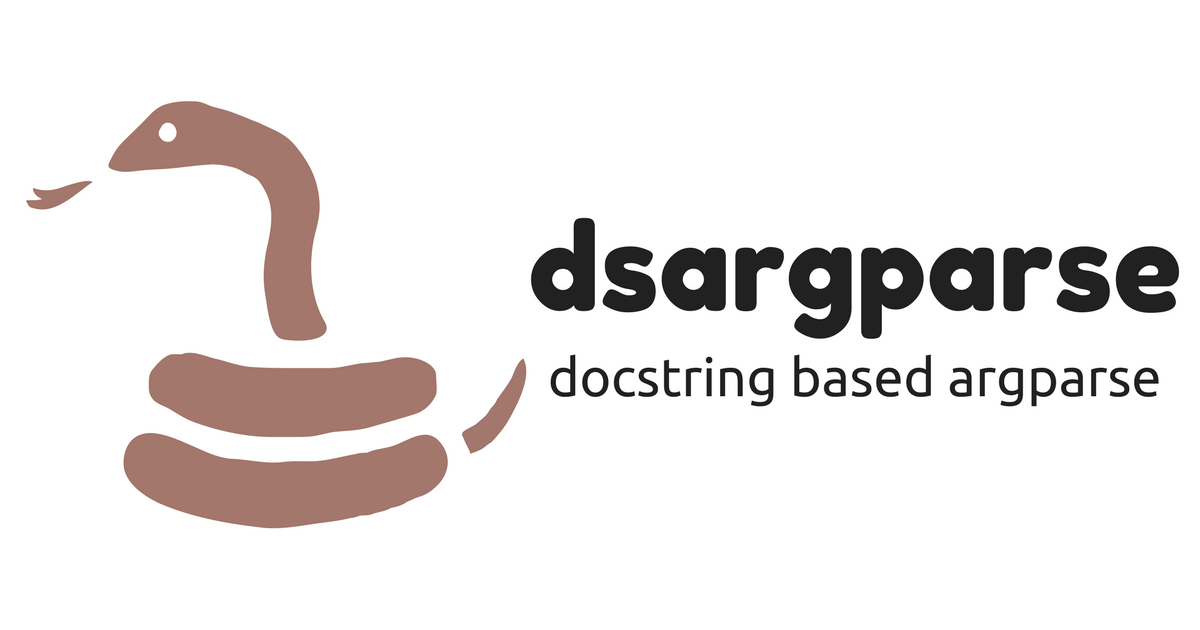dsargparse aims to eliminate redundant codes for building commandline interfaces.
dsargparse is a wrapper of argparse library which tries to retrieve following information from the docstring of the specified function:
- function description
- function detailed description
- arguments (options) that the function has
- help message of arguments
- type of arguments
- default value of arguments
Currently dsargparse supports only docstrings which align with google docstring style, but we'd welcome contributions to make this module support more various styles.
Use pip to install.
$ pip install -U git+https://github.com/yoshihikoueno/dsargparse.git@master
import dsargparse
def greeting(title, name):
"""Print a greeting message.
This command print "Good morning, <title> <name>.".
Args:
title: title of the person.
name: name of the person.
"""
print("Good morning, {title} {name}.".format(**locals()))
return
def goodbye(name):
"""Print a goodbye message.
This command print "Goodbye, <name>.".
Args:
name (str): name of the person say goodbye to.
"""
print("Goodbye, {name}".format(**locals()))
return
def main():
'''CLI interface'''
parser = dsargparse.ArgumentParser(main=main)
subparsers = parser.add_subparsers()
subparsers.add_parser(greeting, add_arguments_auto=True)
subparsers.add_parser(goodbye, add_arguments_auto=True)
return parser.parse_and_run()
if __name__ == "__main__":
main()The above code will behave as below:
python3 test.py --help
# usage: test.py [-h] {greeting,goodbye} ...
#
# CLI interface
#
# positional arguments:
# {greeting,goodbye}
# greeting Print a greeting message.
# goodbye Print a goodbye message.
#
# optional arguments:
# -h, --help show this help message and exit
python3 test.py greeting --help
# usage: test.py greeting [-h] [--title TITLE] [--name NAME]
#
# Print a greeting message.
#
# This command print "Good morning, <title> <name>.".
#
# optional arguments:
# -h, --help show this help message and exit
# --title TITLE title of the person.
# --name NAME name of the person.Suppose we are to expose 2 functions greeting and goodbye to the commandline interface.
def greeting(title, name):
"""Print a greeting message.
This command print "Good morning, <title> <name>.".
Args:
title: title of the person.
name: name of the person.
"""
print("Good morning, {title} {name}.".format(**locals()))
return
def goodbye(name):
"""Print a goodbye message.
This command print "Goodbye, <name>.".
Args:
name (str): name of the person say goodbye to.
"""
print("Goodbye, {name}".format(**locals()))
returnWith built-in module argparse, you would need to code like below:
import argparse
def main():
parser = argparse.ArgumentParser()
subparsers = parser.add_subparsers()
greeting_cmd = subparsers.add_parser(
'greeting',
help='Print a greeting message.',
description='Print a greeting message.\nThis command print "Good morning, <title> <name>".',
)
greeting_cmd.add_argument('title', help='title of the person say greetings to')
greeting_cmd.add_argument('name', help='name of the person say greetings to.')
greeting_cmd.set_defaults(cmd=greeting)
goodbye_cmd = subparsers.add_parser(
'goodbye',
help='Print a goodbye message.',
description='Print a goodbye message.\nThis command print "Goodbye, <name>".',
)
goodbye_cmd.add_argument('name', help='name of the person say goodbye to.')
goodbye_cmd.set_defaults(cmd=goodbye)
args = parser.parse_args()
return args.cmd(**args)
if __name__ == "__main__":
main()Notice that there are many redundant texts in the code above.
Namely, descriptions for the functions and its options are duplicated as they are supposed to be the same as in the function's docstring.
We can remove those redundancies by retrieving necessary information from docstring,
and this is where dsargparse comes in.
With dsargparse, you can do the same thing with much simpler code as shown below:
import dsargparse
def main():
parser = dsargparse.ArgumentParser(main=main)
subparsers = parser.add_subparsers()
greeting_cmd = subparsers.add_parser(greeting, add_arguments_auto=True)
goodbye_cmd = subparsers.add_parser(goodbye, add_arguments_auto=True)
return parser.parse_and_run()
if __name__ == "__main__":
main()Of course you can override whatever you want simply by specifying the stuff you want to override.
import dsargparse
def main():
parser = dsargparse.ArgumentParser(main=main)
subparsers = parser.add_subparsers()
greeting_cmd = subparsers.add_parser(greeting)
greeting_cmd.add_argument("title", help='some custom help here')
greeting_cmd.add_argument("name")
goodbye_cmd = subparsers.add_parser(goodbye)
goodbye_cmd.add_argument("name")
return parser.parse_and_run()
if __name__ == "__main__":
sys.exit(main())In this case, title option of greeting command will get the custom description specified by user argument,
but dsargparse will still try to find the description and type for other options and commands.
User specified arguments are always prioritised over what dsargparse finds in dsargparse.
We tried to keep the behavior of dsargparse as close as argparse, so all the arguments available
in argparse are also available in dsargparse.
You can start using dsargparse just like argparse as it inherits all the classes and functions
with the same arguments. dsargparse will just fill in empty arguments for you where possible.
In addition to the keyword arguments argparse.ArgumentParser takes,
this constructor has keyword argument main which takes the main function.
If you give the main function, you don't need to set description, and
formatter_class also will be set automatically.
This method adds a new argument to the current parser. The function is
same as argparse.ArgumentParser.add_argument. But, this method
tries to retrieve information from the docstring.
If the new arguments belong to some subcommand, the docstring
of a function implements behavior of the subcommand has Args: section,
and defines same name variable, this function sets such
definition to the help message.
After constructing subparsers by subparsers = parser.add_subparsers(),
you may call subparsers.add_parser to add a new subcommand.
The add_parser has a new positional argument func which takes a function
to be called in order to run the subcommand. The func will be used
to determine the name, help, and description of this subcommand. The
function func will also be set as a default value of cmd attribute.
The add_parser also has as same keyword arguments as add_parser of argparse
library.
This method parses arguments and run the selected command. It returns a value
which the selected command returns. This function takes as same arguments as
ArgumentParser.parse_args.
This software is released under the MIT License, see LICENSE.

